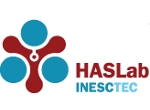Parallel Programming by Transformation
- Citation:
- Gonçalves RC. 2015. Parallel Programming by Transformation.
Thesis Type:
PhD ThesisAbstract:
The development of efficient software requires the selection of algorithms and optimizations tailored for each target hardware platform. Alternatively, performance portability may be obtained through the use of optimized libraries. However, currently all the invaluable knowledge used to build optimized libraries is lost during the development process, limiting its reuse by other developers when implementing new operations or porting the software to a new hardware platform. To answer these challenges, we propose a model-driven approach and framework to encode and systematize the domain knowledge used by experts when building optimized libraries and program implementations. This knowledge is encoded by relating the domain operations with their implementations, capturing the fundamental equivalences of the domain, and defining how programs can be transformed by refinement (adding more implementation details), optimization (removing inefficiencies), and extension (adding features). These transformations enable the incremental derivation of efficient and correct by construction program implementations from abstract program specifications. Additionally, we designed an interpretations mechanism to associate different kinds of behavior to domain knowledge, allowing developers to animate programs and predict their properties (such as performance costs) during their derivation. We developed a tool to support the proposed framework, ReFlO, which we use to illustrate how knowledge is encoded and used to incrementally—and mechanically—derive efficient parallel program implementations in different application domains. The proposed approach is an important step to make the process of developing optimized software more systematic, and therefore more understandable and reusable. The knowledge systematization is also the first step to enable the automation of the development process.

